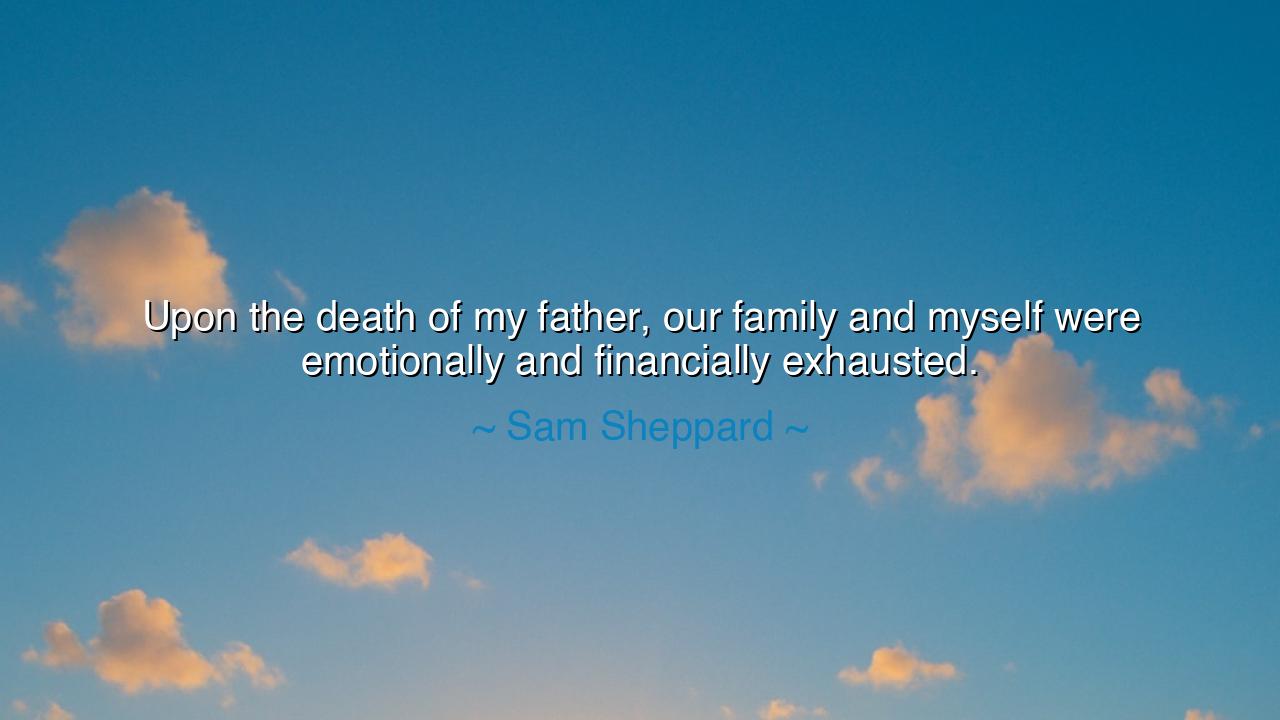
Upon the death of my father, our family and myself were
Upon the death of my father, our family and myself were emotionally and financially exhausted.






The words of Sam Sheppard — “Upon the death of my father, our family and myself were emotionally and financially exhausted” — carry within them not only grief, but the ancient echo of a truth that all generations have known: that when a pillar of the home falls, the roof trembles, and all who dwelt beneath it must find strength anew. In his confession, there is no ornament, no poetry — only the naked honesty of a soul brought low by loss, by responsibility, and by the weight of a world suddenly made heavier. Yet in this simplicity lies the power of wisdom, for sorrow often speaks more truth than triumph ever could.
The death of a father has always been more than the loss of a man; it is the unmooring of a household. In ancient times, when the patriarch fell, it was as though the hearthfire dimmed, the fields grew silent, and the stars themselves withheld their comfort. For the father is not only provider of bread, but also the guardian of spirit, the invisible force that binds family into unity. When that force departs, hearts break and purses empty alike, as Sheppard’s words reveal — emotionally and financially exhausted. It is a double grief, for not only does love suffer, but survival trembles as well.
There is a story told of Marcus Tullius Cicero, the Roman orator, who after the death of his beloved daughter Tullia, withdrew from public life and wrote in despair that “nothing remains to me but tears.” Though his empire stood strong and his wealth remained, he felt utterly impoverished — for grief is a thief that robs even kings of their crown. And yet, in time, Cicero’s mourning gave birth to reflection, and his reflection gave birth to philosophy. From loss, he learned that exhaustion of the heart is not the end, but the beginning of understanding.
So it is with Sam Sheppard, whose pain was not only personal but shared. His family’s emotional exhaustion speaks of love stretched thin by mourning; their financial exhaustion reveals how intertwined human hearts are with the fabric of daily life. When the soul collapses, the hands lose their strength to labor. When grief takes root, even the simplest task feels insurmountable. Thus, his words are not only lamentation — they are testimony to the cost of loss, both seen and unseen. They remind us that grief is not only spiritual but earthly, not only internal but communal.
The origin of such exhaustion lies in the nature of dependency and devotion. A father, in his lifetime, carries burdens quietly so that his family may rest in peace. His passing exposes the hidden weight he bore — debts unseen, sacrifices unspoken, efforts unnoticed. Only when he is gone do the living perceive the magnitude of his love. The financial strain that follows death is not mere misfortune; it is the revelation of all the invisible labor that once sustained the family’s life. In mourning, we do not only lose a person — we lose a foundation, a rhythm, a protection that we had forgotten to name.
But from such darkness comes the call to rise. The ancients taught that suffering is the forge of the soul, and exhaustion, though cruel, is also sacred. For in being emptied, the heart becomes ready to receive new strength. The wise do not flee from grief — they honor it, learn from it, and then, step by step, rebuild what was lost. When Sheppard speaks of exhaustion, he speaks for all who have faced the breaking of the world they knew. Yet hidden within his sorrow lies a seed of endurance — the truth that from ruin, families can learn to rise again through shared resilience and remembrance.
Therefore, let us draw a lesson from his pain. When loss comes — and it shall come to all — do not resist the grief that empties you. Let it burn, let it cleanse, and when its fire softens, begin to rebuild with gentleness. Tend to both the heart and the earthly needs of life, for both must heal together. Support the grieving not only with words, but with bread, with time, with presence. And above all, remember the one who is gone not as an absence, but as a light whose warmth, though unseen, still burns in those who remain.
For in the end, as Sheppard’s words remind us, to be exhausted by love is still to have loved greatly. The soul that has known both abundance and emptiness becomes like the soil after rain — softer, wiser, ready for new life. Grief does not end the story; it deepens it. And when the heart learns again to stand, it stands not as it was before — but stronger, humbler, and more tender to the sufferings of others. Thus, through sorrow, the spirit of the father lives on — not in the strength he once gave, but in the strength he taught his children to find within themselves.






AAdministratorAdministrator
Welcome, honored guests. Please leave a comment, we will respond soon